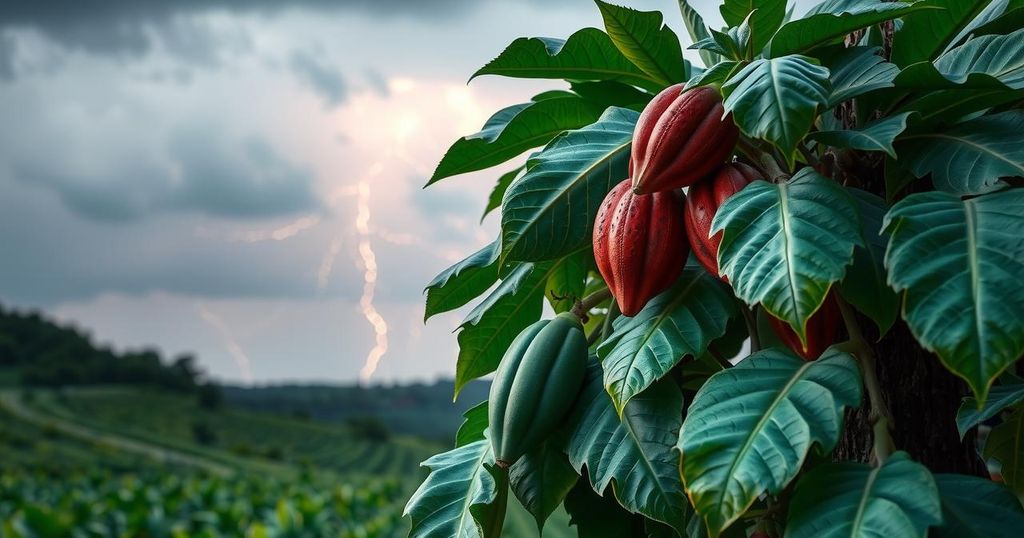Impact of Climate Change on Cocoa Production and Chocolate Industry

A Christian Aid report reveals that climate change is severely affecting cocoa production, prompting a 400% price increase due to extreme weather in key growing regions. Cocoa shortages threaten chocolate supplies and the livelihoods of farmers in Côte d’Ivoire and Ghana. Urgent action is required to address emissions and support sustainable practices in cocoa farming.
Climate change is imposing a severe threat on cocoa production, as highlighted by a recent report released by Christian Aid. Cocoa prices surged by 400% in recent years, with a significant heatwave in West Africa being declared ten times more likely due to climate change. Major cocoa-producing countries, including Côte d’Ivoire and Ghana, have witnessed rising temperatures which are detrimental to cocoa plants, threatening both their harvests and the livelihoods of farmers who depend on them.
For the past two years, cocoa farmers have experienced escalating challenges due to extreme weather conditions, including droughts and erratic rainfall. This has led to record-high cocoa prices, adversely affecting chocolate producers, including renowned brands in the UK and global giants like Nestlé. The scarcity of cocoa from affected regions has resulted in smaller chocolate sizes, creating a ripple effect throughout the confectionery market.
The alarming trends indicate that 71% of cacao-producing areas across West Africa experienced temperatures exceeding 32°C in 2024 alone, adversely affecting optimal growing conditions. As a consequence, both small manufacturers and larger companies are struggling to cope with soaring prices, which in some cases are nearing unsustainable levels. Many small-scale producers face the risk of going out of business due to these unprecedented market shifts.
Osai Ojigho of Christian Aid emphasized the urgent need for action to reduce emissions, stating, “Growing cocoa is a vital livelihood for many of the poorest people around the world and human-caused climate change is putting that under serious threat.” Meanwhile, cocoa farmers like Amelia are struggling with the direct impact of changing climate; many plantations are suffering from decreased yields due to drought and water shortages.
Furthermore, industry representatives argue that long-term solutions must include creating sustainable trade practices and ensuring fair prices for producers. Alexander Carnwath from Fairtrade Foundation highlights the importance of higher prices for cocoa as vital for effective climate action. Companies, such as Whitakers Chocolates, are also committed to sustainable practices, acknowledging climate change’s role in threatening cocoa farming.
In essence, the cocoa sector is undergoing a crisis as rising market prices coincidentally relate to climate change impacts. With the primary cocoa-producing nations sharing borders and experiencing similar climatic challenges, finding solutions is crucial not only for farmers but also for chocolate lovers globally, who are at risk of facing a dwindling supply of their beloved treat.
The cocoa crisis, driven by climate change, poses significant risks to both chocolate production and the livelihoods of cocoa farmers globally. Rising cocoa prices and increasingly unfavorable weather conditions threaten the feasibility of cocoa farming, demanding immediate action to reduce emissions and enhance support for farmers. As climate impacts intensify, solutions ensuring fair trade and sustainable practices in the cocoa industry are essential for protecting both farmers and consumers.
Original Source: reliefweb.int







